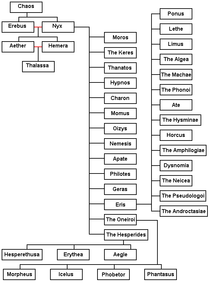Erebus
In Greek mythology, Erebus /ˈɛrɪbəs/,[1] also Erebos (Ancient Greek: Ἔρεβος, Érebos, "deep darkness, shadow"[2] or "covered"[3]), was often conceived as a primordial deity, representing the personification of darkness; for instance, Hesiod's Theogony identifies him as one of the first five beings in existence, born of Chaos.[4]
| Erebus | |
|---|---|
God of Darkness | |
| Personal information | |
| Parents | Chaos |
| Siblings | Nyx Tartarus Gaia Eros |
| Consort | Nyx |
| Offspring | Thanatos, Apate, Aether, Hemera, Hypnos, the Keres, Moros, the Moirai, the Hesperides, Dolos, Nemesis, Oizys, Oneiroi, Momus, Philotes, Eris, Geras |
| Roman equivalent | Scotus |

| Greek deities series |
|---|
| Primordial deities |
| Chthonic deities |
Etymology
The perceived meaning of Erebus is "darkness"; the first recorded instance of it was "place of darkness between earth and Hades". The name Ἔρεβος itself originates from PIE *h1regʷ-es/os- "darkness"[5][6] (cf. Sanskrit rájas, Gothic riqis, Old Norse røkkr).[2]
Mythology
According to the Greek oral poet Hesiod's Theogony, Erebus is the offspring of Chaos, and brother to Nyx:
From Chaos came forth Erebus and black Night (Nyx); but of Night were born Aether and Day (Hemera), whom she conceived and bore from union in love with Erebus.[4]
Erebus features little in Greek mythological tradition and literature, but is said to have fathered several other deities with Nyx; depending on the source of the mythology, this union includes Aether, Hemera, the Hesperides, Hypnos, the Moirai, Geras, Styx, Charon, Nemesis and Thanatos.[7]
In Greek literature, the name Erebus is also used as a region of the Greek underworld where the dead pass immediately after dying, and is sometimes used interchangeably with Tartarus.[8][9][10][11][12]
Notes
- Wells, John C. (2008), Longman Pronunciation Dictionary (3rd ed.), Longman, ISBN 9781405881180
- Ἔρεβος. Liddell, Henry George; Scott, Robert; A Greek–English Lexicon at the Perseus Project.
- Robert Graves. The Greek Myths, section 31 s.v. The Gods Of The Underworld
- Hesiod. Theogony, 116–124.
- Harper, Douglas. "Online Etymology Dictionary: Erebus". Retrieved 1 July 2011.
- R. S. P. Beekes, Etymological Dictionary of Greek, Brill, 2009, p. 451.
- Hyginus. Fabulae, 1-49
- Elizabeth, Alice (1896). The Sources of Spenser's Classical Mythology. New York: Silver, Burdett and Company. pp. 52, 55.
- Morford, Mark P. O. (1999). Classical Mythology: Sixth Edition. New York: Oxford University Press US. pp. 36, 84, 253, 263, 271. ISBN 0-19-514338-8., ISBN 9780195143386
- Peck, Harry Thurston (1897). Harper's Dictionary of Classical Literature and Antiquities, Volume 1. New York: Harper. p. 620.
- Rengel, Marian (2009). Greek and Roman Mythology A to Z. Infobase Publishing. p. 51. ISBN 1-60413-412-7., ISBN 9781604134124
- Turner, Patricia (2001). Dictionary of Ancient Deities. Oxford University Press. p. 170. ISBN 0-19-514504-6., ISBN 9780195145045
References
| Look up Erebus in Wiktionary, the free dictionary. |
- Hesiod, Theogony from The Homeric Hymns and Homerica with an English Translation by Hugh G. Evelyn-White, Cambridge, MA.,Harvard University Press; London, William Heinemann Ltd. 1914. Online version at the Perseus Digital Library. Greek text available from the same website.
- Hyginus, Fabulae from The Myths of Hyginus translated and edited by Mary Grant. University of Kansas Publications in Humanistic Studies. Online version at the Topos Text Project.
- Smith, William; Dictionary of Greek and Roman Biography and Mythology, London (1873). "E'rebos"